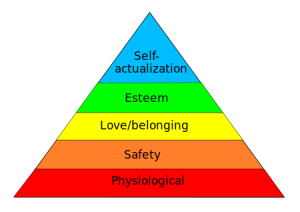My natural instinct is to eat cookies and watch TV. Unless acted upon by an outside force (my wife), this is what I do. I am motivated by self-gratification. A glass of milk makes it complete debauchery.
In 1943 Abraham Maslow wrote an academic paper titled, “A Theory of  Human Motivation.” Most Psychology 101 students have studied his work. Maslow identified five levels of human need in hierarchical order: food and shelter, safety, love/belonging, esteem, self-actualization. I’m no psychologist, but Maslow’s theory makes a lot of sense to me.
Human Motivation.” Most Psychology 101 students have studied his work. Maslow identified five levels of human need in hierarchical order: food and shelter, safety, love/belonging, esteem, self-actualization. I’m no psychologist, but Maslow’s theory makes a lot of sense to me.
Motivation drives behavior, and we are often motivated by selfish needs, and selfishness is not always bad. If Maslow’s theory is right, we all have a hierarchy of needs, some basic and some aspirational. The most basic is food and shelter. Nothing wrong with that; God wired us that way as a survival mechanism. Humans had all their physical needs provided in Eden, but Adam and Eve messed that up for everyone.
Humans also seek safety. Again, this is natural and normal. Even Jesus wanted to avoid pain and suffering (Matt. 26:39).
You could categorize the first two levels of Maslow’s needs pyramid – food/shelter and safety – as basic human requirements. The others represent a higher level of need, more mental and spiritual. These are needs of the soul.
Next on Maslow’s list are love and belonging. We are social beings who need human interaction. Scientists report finding “feral children” (the very phrase induces heartache) who lack basic language and motor skills. People in loving, long-term relationships are said to have lower blood pressure, less anxiety and less substance abuse. Note the key words “loving” and “long term.” If not loving and long-term, relationships can often produce the opposite effects.
Esteem is the desire to be valued. This is where things get metaphysical. Does esteem only come from others or is it something we develop within ourselves? Maslow said that humans will not build self-esteem until they accept who they are internally. Who am I internally? Do I have characteristics that make me estimable? Those are valid questions that most people ask about themselves.
Self-actualization is achieving your own significant life goals, the goals you set for yourself. Maybe it’s to become a Super Bowl champion or perhaps be the world’s best mom… your life goals are determined by the things you value most. What do you value?
Late in his life, Maslow added another need to the list: self-transcendence. He theorized that people can only be truly actualized when they give themselves to a higher goal. This would include altruism and matters of the spirit. Maslow, himself an atheist, realized that man’s greatest achievement and highest goal is in recognizing there is something more important than oneself.
Through Jesus, I can fulfill those tricky higher needs of love, esteem and self-actualization. As a follower of Christ, I have unconditional love and I belong to a family – the family of God. Because of this relationship, I am esteemed – God sacrificed something of great value for my soul. My self-actualization is complete because I have the most important job in the world; I am an ambassador for Jesus Christ. This is a high and worthy goal. Being the POTUS pales by comparison.
The Bible tells us about our natural human nature and how to change it. You can read about it in Ephesians. First read chapter 2, verses 1-3, then flip to chapter 4, verses 17-24 to see how a person’s nature can be transformed.
I’m still fighting some selfish desires like cookies, TV, lust, bitterness and self-righteousness. To win the fight I have to change my motivation from self to God. My highest need is the Lord. When you think about it, Maslow was right.
“Before I formed you in the womb I knew you, and before you were born I consecrated you; I appointed you a prophet to the nations.” – Jeremiah 1:5

